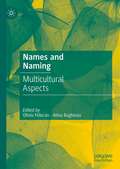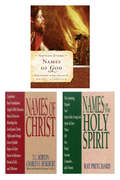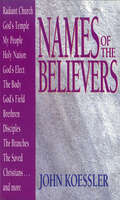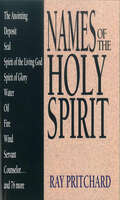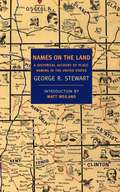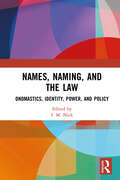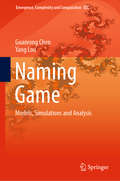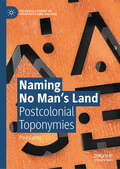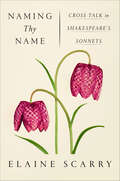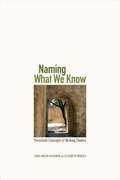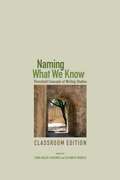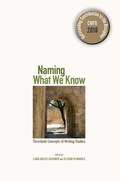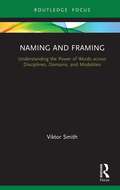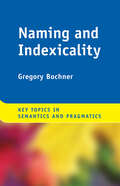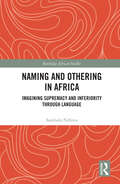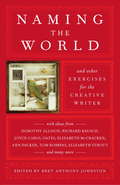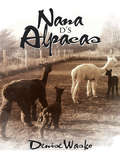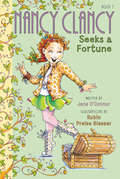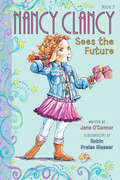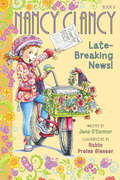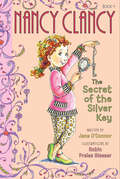- Table View
- List View
Names and Naming: Multicultural Aspects
by Oliviu Felecan Alina BugheșiuThis edited book examines names and naming policies, trends and practices in a variety of multicultural contexts across America, Europe, Africa and Asia. In the first part of the book, the authors take theoretical and practical approaches to the study of names and naming in these settings, exploring legal, societal, political and other factors. In the second part of the book, the authors explore ways in which names mirror and contribute to the construction of identity in areas defined by multiculturalism. The book takes an interdisciplinary approach to onomastics, and it will be of interest to scholars working across a number of fields, including linguistics, sociology, anthropology, politics, geography, history, religion and cultural studies.
Names of God/Names of Christ/Names of the Holy Spirit Set
by Nathan Stone T.C. Horton Charles E. Hurlburt Ray PritchardThis complete, three-volume set includes Names of God, Names of Christ, and Names of Holy Spirit.In Names of God, Nathan J. Stone writes, &“Indeed we cannot say all that the mysterious word God means to us until we know more about Him.&” God&’s many names reveal not only different dimensions of His character but also point to their fulfillment in the Person and work of Jesus Christ. This insightful little book accurately and clearly works through the many names of God throughout the Old Testament. We can now see God in new lights and angles as we learn of His justice, His unbounded love, His preeminence, and His character--all through His names. In Names of Christ, more than 300 names of Christ are examined in all, each revealing an intimate portrait of the Savior. In this new edition, devotional prayers accompany each name, helping you meditate on the character and person of Jesus Christ. This book is an invaluable resource to any library and is sure to enrich your personal devotional time. In Names of the Holy Spirit, the author examines the Holy Spirit's ministry throughout Scripture as revealed in the names the Bible gives Him. Knowledge of Him will help you understand:His power His indwelling His anointing His intercession His gifts Fruit produced in believers
Names of God/Names of Christ/Names of the Holy Spirit Set
by Nathan Stone T.C. Horton Charles E. Hurlburt Ray PritchardThis complete, three-volume set includes Names of God, Names of Christ, and Names of Holy Spirit.In Names of God, Nathan J. Stone writes, &“Indeed we cannot say all that the mysterious word God means to us until we know more about Him.&” God&’s many names reveal not only different dimensions of His character but also point to their fulfillment in the Person and work of Jesus Christ. This insightful little book accurately and clearly works through the many names of God throughout the Old Testament. We can now see God in new lights and angles as we learn of His justice, His unbounded love, His preeminence, and His character--all through His names. In Names of Christ, more than 300 names of Christ are examined in all, each revealing an intimate portrait of the Savior. In this new edition, devotional prayers accompany each name, helping you meditate on the character and person of Jesus Christ. This book is an invaluable resource to any library and is sure to enrich your personal devotional time. In Names of the Holy Spirit, the author examines the Holy Spirit's ministry throughout Scripture as revealed in the names the Bible gives Him. Knowledge of Him will help you understand:His power His indwelling His anointing His intercession His gifts Fruit produced in believers
Names of the Believers (Names of... Series)
by John KoesslerWhat's in a name?In our culture, parents often select names for their children that are popular or have a nice ring to them. But our heavenly Father bestows on His children names that carry far more meaning and significance. In fact, the Bible reveals many labels believers have that indicate calling, position, and giftedness in Christ.In this devotional study, Dr. John Koessler shows that the names Christ gives to His followers contain more importance and richness than we often realize. Written in a fresh and compelling style, Names of the Believers will encourage and inspire Christians to live up to the names God Himself has given them.Names of the Believers follows the Names of God, Names of Christ, and Names of the Holy Spirit trilogy designed to help Christians better understand the glory, majesty, and power of the triune God.
Names of the Believers (Names of... Series)
by John KoesslerWhat's in a name?In our culture, parents often select names for their children that are popular or have a nice ring to them. But our heavenly Father bestows on His children names that carry far more meaning and significance. In fact, the Bible reveals many labels believers have that indicate calling, position, and giftedness in Christ.In this devotional study, Dr. John Koessler shows that the names Christ gives to His followers contain more importance and richness than we often realize. Written in a fresh and compelling style, Names of the Believers will encourage and inspire Christians to live up to the names God Himself has given them.Names of the Believers follows the Names of God, Names of Christ, and Names of the Holy Spirit trilogy designed to help Christians better understand the glory, majesty, and power of the triune God.
Names of the Holy Spirit (Names of... Series)
by Ray PritchardSpirit of Truth. Dove. Spirit of Holiness. Eyes of the LordHow much do you know about the person and works of the Holy Spirit? To many Christians, the third member of the Trinity is a mystery.This devotional study of the Holy Spirit looks at His ministry throughout Scripture as revealed in the names the Bible gives Him. Knowledge of Him will help you understand:-His power -His intercession-His indwelling -His gifts-His anointing -Fruit produced in believersNames of the Holy Spirit follows Names of Christ in a trilogy designed to help Christians better understand the glory, majesty, and power of the triune God.
Names of the Holy Spirit (Names of... Series)
by Ray PritchardSpirit of Truth. Dove. Spirit of Holiness. Eyes of the LordHow much do you know about the person and works of the Holy Spirit? To many Christians, the third member of the Trinity is a mystery.This devotional study of the Holy Spirit looks at His ministry throughout Scripture as revealed in the names the Bible gives Him. Knowledge of Him will help you understand:-His power -His intercession-His indwelling -His gifts-His anointing -Fruit produced in believersNames of the Holy Spirit follows Names of Christ in a trilogy designed to help Christians better understand the glory, majesty, and power of the triune God.
Names on the Land: A Historical Account of Place-Naming in the United States
by George R. StewartGeorge R. Stewart's classic study of place-naming in the United States was written during World War II as a tribute to the varied heritage of the nation's peoples. More than half a century later, Names on the Land remains the authoritative source on its subject, while Stewart's intimate knowledge of America and love of anecdote make his book a unique and delightful window on American history and social life. Names on the Land is a fascinating and fantastically detailed panorama of language in action. Stewart opens with the first European names in what would later be the United States-- Ponce de León's flowery Florída, Cortés's semi-mythical isle of California, and the red Rio Colorado-- before going on to explore New England, New Amsterdam, and New Sweden, the French and the Russian legacies, and the unlikely contributions of everybody from border ruffians to Boston Brahmins. These lively pages examine where and why Indian names were likely to be retained; nineteenth-century fads that gave rise to dozens of Troys and Athens and to suburban Parksides, Brookmonts, and Woodcrest Manors; and deep and enduring mysteries such as why "Arkansas" is Arkansaw, except of course when it isn't. Names on the Land will engage anyone who has ever wondered at the curious names scattered across the American map. Stewart's answer is always a story-- one of the countless stories that lie behind the rich and strange diversity of the USA.
Names, Naming, and the Law: Onomastics, Identity, Power, and Policy
by I. M. NickAcross many social and commercial domains, governments regulate the official names used to identify individuals, groups, places, companies & products, and even diseases. This innovative volume investigates the relationship between names and the law, with its significant implications for identity (individual, familial, race, ethnicity, gender, species, brand & product industry, etc.) and status (social, scientific, economic, and political). I. M. Nick introduces the state of the art on this interdisciplinary topic¾ providing a diachronic and synchronic view of onomastics and the law¾ and expert contributors examine seminal Anglo-American legal cases to demonstrate how name polices relate to broader questions of power, privilege, and politics. Each chapter offers an overview of key issues in onomastics and language policy across multiple geo-cultural contexts, and applies the interdisciplinary insights to real-world policies. This book is a valuable resource for scholars of legal linguistics, forensic linguistics, onomastics, language policy, and cultural studies.
Names, Proverbs, Riddles, and Material Text in Robert Frost
by Timothy D. O’brienThis study examines several unexplored aspects of the poetry of Robert Frost, one of the most widely read and studied American poets, and shows how they contribute to the reader's experience and modernism in general.
Naming Game: Models, Simulations and Analysis (Emergence, Complexity and Computation #34)
by Guanrong Chen Yang LouThis book provides a gradual introduction to the naming game, starting from the minimal naming game, where the agents have infinite memories (Chapter 2), before moving on to various new and advanced settings: the naming game with agents possessing finite-sized memories (Chapter 3); the naming game with group discussions (Chapter 4); the naming game with learning errors in communications (Chapter 5) ; the naming game on multi-community networks (Chapter 6) ; the naming game with multiple words or sentences (Chapter 7) ; and the naming game with multiple languages (Chapter 8). Presenting the authors’ own research findings and developments, the book provides a solid foundation for future advances. This self-study resource is intended for researchers, practitioners, graduate and undergraduate students in the fields of computer science, network science, linguistics, data engineering, statistical physics, social science and applied mathematics.
Naming No Man’s Land: Postcolonial Toponymies (Palgrave Studies in Creativity and Culture)
by Paul CarterThis book is a practice-based exploration of the politics and poetics of replacing colonial placenames with Indigenous ones. From a horizon of case-studies in Western Australia, the study develops a lively dialogue with international critical toponymy theory and with older etymological approaches to place renaming and legitimation. The author shows how renaming raises fundamental questions of meaning, reference and cross-cultural equivalence. Recognising the ‘sense of place’ values that accrue to placenames, Carter argues that placenames have a creative as well as discursive function: they are talking points that bring places into being. For this reason, to decolonize toponymy involves a postcolonial poetics. Naming No Man’s Land argues for a practical, community-shaped toponymic poetics that escapes from the binarist logic of imposition/erasure, showing that, when the principle that ‘places are made after their stories’ is followed, new creative mechanisms of co-existence can emerge. A must read for anyone engaged in postcolonial studies, creativity studies, cultural geography, sociolinguistics, historical ethnography, eco-criticism, environmental humanities, (Australian) Aboriginal studies, and related disciplines.
Naming Thy Name: Cross Talk in Shakespeare's Sonnets
by Elaine ScarryA fascinating case for the identity of Shakespeare’s beautiful young manSHAKESPEARE’S SONNETS ARE indisputably the most enigmatic and enduring love poems written in English. They also may be the most often argued-over sequence of love poems in any language. But what is it that continues to elude us? While it is in part the spellbinding incantations, the hide-and-seek of sound and meaning, it is also the mystery of the noble youth to whom Shakespeare makes a promise—the promise that the youth will survive in the breath and speech and minds of all those who read these sonnets. “How can such promises be fulfilled if no name is actually given?” Elaine Scarry asks. This book is the answer. Naming Thy Name lays bare William Shakespeare’s devotion to a beloved whom he not only names but names repeatedly in the microtexture of the sonnets, in their architecture, and in their deep fabric, immortalizing a love affair. By naming his name, Scarry enables us to hear clearly, for the very first time, a lover’s call and the beloved’s response. Here, over the course of many poems, are two poets in conversation, in love, speaking and listening, writing and writing back. In a true work of alchemy, Scarry, one of America’s most innovative and passionate thinkers, brilliantly synthesizes textual analysis, literary criticism, and historiography in pursuit of the haunting call and recall of Shakespeare’s verse and that of his (now at last named) beloved friend.
Naming What We Know
by Linda Adler-KassnerNaming What We Know examines the core principles of knowledge in the discipline of writing studies using the lens of "threshold concepts"--concepts that are critical for epistemological participation in a discipline. The first part of the book defines and describes thirty-seven threshold concepts of the discipline in entries written by some of the field's most active researchers and teachers, all of whom participated in a collaborative wiki discussion guided by the editors. These entries are clear and accessible, written for an audience of writing scholars, students, and colleagues in other disciplines and policy makers outside the academy. Contributors describe the conceptual background of the field and the principles that run throughout practice, whether in research, teaching, assessment, or public work around writing. Chapters in the second part of the book describe the benefits and challenges of using threshold concepts in specific sites--first-year writing programs, WAC/WID programs, writing centers, writing majors--and for professional development to present this framework in action.Naming What We Know opens a dialogue about the concepts that writing scholars and teachers agree are critical and about why those concepts should and do matter to people outside the field.
Naming What We Know, Classroom Edition: Threshold Concepts of Writing Studies
by edited by Linda Adler-Kassner, Elizabeth WardleNaming What We Know, Classroom Edition examines the core principles of knowledge in the discipline of writing studies, using the lens of “threshold concepts”—concepts that are critical for epistemological participation in a discipline. This edition focuses on the working definitions of thirty-seven threshold concepts that run throughout the research, teaching, assessment, and public work in writing studies. Developed from the highly regarded original edition in response to grassroots demand from teachers in writing programs around the United States and written by some of the field’s most active researchers and teachers, the classroom edition is clear and accessible for an audience of even first-year writing students.
Naming What We Know: Threshold Concepts of Writing Studies
by Elizabeth Wardle Linda Adler-KassnerNaming What We Know examines the core principles of knowledge in the discipline of writing studies using the lens of “threshold concepts”—concepts that are critical for epistemological participation in a discipline. The first part of the book defines and describes thirty-seven threshold concepts of the discipline in entries written by some of the field’s most active researchers and teachers, all of whom participated in a collaborative wiki discussion guided by the editors. These entries are clear and accessible, written for an audience of writing scholars, students, and colleagues in other disciplines and policy makers outside the academy. Contributors describe the conceptual background of the field and the principles that run throughout practice, whether in research, teaching, assessment, or public work around writing. Chapters in the second part of the book describe the benefits and challenges of using threshold concepts in specific sites—first-year writing programs, WAC/WID programs, writing centers, writing majors—and for professional development to present this framework in action. Naming What We Know opens a dialogue about the concepts that writing scholars and teachers agree are critical and about why those concepts should and do matter to people outside the field.
Naming and Framing: Understanding the Power of Words across Disciplines, Domains, and Modalities (Routledge Studies in Multimodality)
by Viktor SmithThis book offers an innovative, unified theoretical model for better understanding the processes underpinning naming and framing and the power that words exert over human minds. The volume integrates theoretical paradigms and empirical insights from across a broad array of research disciplines, several of which have not been combined before, and uses this foundation as a point of departure for introducing its four-layered model of distinct but connected levels of analysis. Bringing together insights from cognitive linguistics and psycholinguistics together with multimodal perspectives, Smith establishes new cross-disciplinary links, further integrating work from neighbouring fields such as marketing, health communication, and political communication, that indicate paths for future research and implications for communicative ethics. This book will be of particular interest to students and scholars in multimodality, communication, semiotics, cognitive psychology, and linguistics, as well as those in related disciplines such as marketing, political communication, and health communication.
Naming and Indexicality (Key Topics in Semantics and Pragmatics)
by Gregory BochnerHow do words stand for things? Taking ideas from philosophical semantics and pragmatics, this book offers a unique, detailed, and critical survey of central debates concerning linguistic reference in the twentieth century. It then uses the survey to identify and argue for a novel version of current 'two-dimensional' theories of meaning, which generalise the context-dependency of indexical expressions. The survey highlights the history of tensions between semantic and epistemic constraints on plausible theories of word meaning, from analytic philosophy and modern truth-conditional semantics, to the Referentialist and Externalist revolutions in theories of meaning, to the more recent reconciliatory ambition of two-dimensionalists. It clearly introduces technical semantical notions, theses, and arguments, with easy-to-follow, step-by-step guides. Wide-ranging in its scope, yet offering an accessible route into literature that can seem complex and technical, this will be essential reading for advanced students, and academic researchers in semantics, pragmatics, and philosophy of language.
Naming and Othering in Africa: Imagining Supremacy and Inferiority through Language (Routledge African Studies)
by Sambulo NdlovuThis book examines how names in Africa have been fashioned to create dominance and subjugation, inclusion and exclusion, others and self. Drawing on global and African examples, but with particular reference to Zimbabwe, the author demonstrates how names are used as weapons by in-groups and out-groups in class, race, ethnic, national, gender, sexuality, religious and business struggles in society. Using Othering theory as a framework, the chapters explore themes such as globalised names and their demonstration of the other, onomastic erasure in colonial naming and the subsequent decoloniality in African name changes, othering of women in onomastics and crude and sophisticated phaulisms in the areas of race, ethnicity, nationality, disability, sexuality. Highlighting social power dynamics through onomastics, this book will be of interest to researchers of onomastics, social anthropology, sociolinguistics and African culture and history.
Naming the World: And Other Exercises for the Creative Writer
by Bret Anthony JohnstonYou already have the tools to become a gifted writer; what you need is the spark. Harvard creative writing professor and acclaimed author Bret Anthony Johnston brings you an irresistible interactive guide to the craft of narrative writing. From developing characters to building conflict, from mastering dialogue to setting the scene, Naming the World jump-starts your creativity with inspiring exercises that will have you scrambling for pen and paper. Every chapter is a master class with the country's most eminent authors, renowned editors, and dedicated teachers. * Infuse emotion into your fiction with three key strategies from Margot Livesey. * Christopher Castellani dumps the "write what you know" maxim and challenges you to really delve into the imagination. * A point-of-view drill from Susan Straight can be just the breakthrough you need to flesh out your story. * Jewell Parker Rhodes shares how good dialogue is not just about what is being said but about what is being left unsaid. Brimming with imaginative springboards and hands-on exercises, Naming the World has everything you need to become a stronger, more inventive writer. "A delicious book. Imagine yourself at a cocktail party crammed with literary lions. You have the chance to spend a few moments with each of them. Wit and wisdom abound." -Julia Cameron, author of The Artist's Way. "A highly useful and perceptive book. With charm and intelligence it touches on nearly every teachable aspect of the devilishly difficult art of writing." -Ethan Canin, professor of creative writing at the Iowa Writers Workshop, and author of Carry Me Across the Water. "These entertaining and useful exercises, intelligently organized, are a boon for both beginning and experienced writers." -Andrea Barrett, National Book Award--winning author of The Air We Breathe. "Forget about getting an MFA! For any writer struggling with his craft, here is the equivalent of a master class in writing by some of the best writer/teachers around." -Betsy Lerner, author of The Forest for the Trees: An Editor's Advice to Writers.
Nana D's Alpacas
by Denise WaskoMs. Emily and her preschool classroom take an adventurous trip to learn more about alpacas. Come along on the journey to discover how curiosity and investigation lead to a love of outdoor learning.
Nancy Clancy Seeks a Fortune (I Can Read! #7)
by Jane O'Connor Robin Preiss Glasser Carolyn BrackenNancy Clancy learns all about starting a business and making a fortune in the seventh chapter book in the Nancy Clancy chapter book series by New York Times bestselling team Jane O'Connor and Robin Preiss Glasser! <P><P>How great would it be to be wealthy--that's elegant for rich. Nancy Clancy sure thinks so, and with the help of her best friend, Bree, she sets out to make a fortune one way or another. <P>But when things don't go as planned, Nancy learns something even more valuable--some of the best things in life are free.
Nancy Clancy Sees the Future (I Can Read! #3)
by Jane O'ConnorNancy Clancy is back in New York Times bestselling team Jane O'Connor and Robin Preiss Glasser's third Fancy Nancy chapter book, Nancy Clancy Sees the Future! Nancy thinks she may be able to read the future . . . and all signs point to her being a true clairvoyant--that's fancy for fortune-teller. <P><P>In this perfect follow-up to Nancy Clancy, Super Sleuth and Nancy Clancy, Secret Admirer, Nancy tries her hand at fortune-telling but quickly learns it's a bit more complicated than she thought. Does Nancy really have special powers, or is it all just a coincidence? <P>Fancy Nancy fans will love joining Nancy Clancy in the latest edition to the chapter book series. The central theme of all the Nancy Clancy books shines through, showing the power of positive thinking.
Nancy Clancy, Late-Breaking News! (I Can Read! #8)
by Jane O'Connor Robin Preiss GlasserFrom New York Times bestselling team Jane O’Connor and Robin Preiss Glasser comes the eighth and final installment of the Fancy Nancy chapter book series: Nancy Clancy and the Late-Breaking News! <P><P>Nancy Clancy is working to be the star reporter of the Third Grade Gazette—that’s a fancy word for newspaper. <P>When the latest issue comes out, Nancy and Bree decide the articles just aren’t interesting enough and set out to find some really exciting news to report on. <P> But when Nancy overhears something she shouldn’t and the news gets out, she learns that a good reporter knows when to keep things confidential and may even get some surprising and unexpected news herself.
Nancy Clancy, Secret of the Silver Key (I Can Read! #4)
by Jane O'Connor Robin Preiss Glasser<P>Join Nancy Clancy in New York Times bestselling team Jane O'Connor and Robin Preiss Glasser's fourth Nancy Clancy chapter book about the past, present, and future! Nancy and her best friend, Bree, must go back in time to solve their latest mystery. <P>While Nancy's class learns about time capsules in school, another relic from the past pops up in the present. Nancy buys an old desk at a tag sale and soon finds out that someone left behind a key. In the perfect follow-up to Nancy Clancy, Super Sleuth; Nancy Clancy, Secret Admirer; and Nancy Clancy Sees the Future, Nancy and Bree set out to unlock the secret of the silver key in the hopes of finding some treasure along the way. <P>But unlocking the mystery soon proves to be more difficult than they had thought, and when the answer isn't what they had expected, Nancy and Bree learn there are some things that remain timeless forever. Fans of Fancy Nancy will love joining Nancy Clancy in the latest edition to the chapter book series. The central theme of all the Nancy Clancy books shines through, showing the power of positive thinking and the will to never give up.
